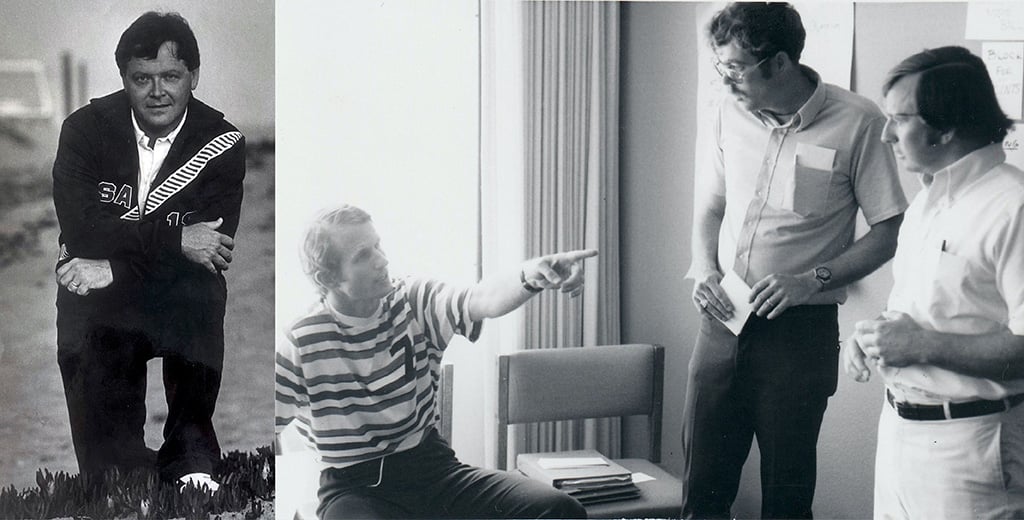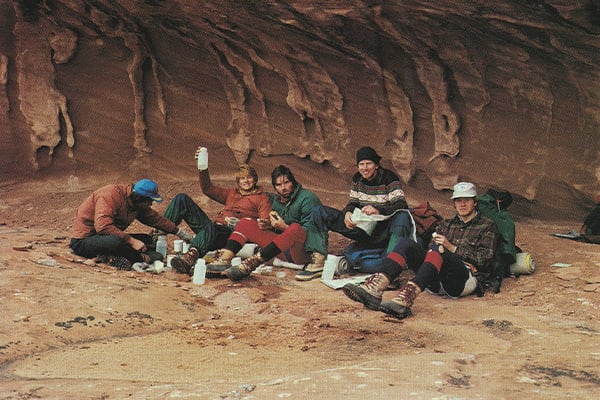If Gold Is Our Destiny: How a Team of Mavericks Came Together for Olympic Glory
When the U.S. men’s volleyball team won their first ever gold medal at the 1984 Los Angeles Olympics, most of the players were alumni of USC, UCLA, or Pepperdine, but several Oregon Ducks played a supporting role. In my book, If Gold Is Our Destiny: How a Team of Mavericks Came Together for Olympic Glory, I chronicle the story of this amazing team and their incredible journey to become the best in the world.
In the early 1970s, three Oregon graduate students including my father Don Murray, MA ’71 (counseling), PhD ’73 (educational psychology), Charles (Chuck) L. Johnson Jr., MA ’69 (education), PhD ’71 (education), and Carl McGown, PhD ’71 (physical education) became friends. Each was married with children, and all three families lived near each other in the Westmoreland married housing complex.
McGown was an accomplished volleyball player and coach who served as the assistant coach to the men’s national team at the 1970 world championships in Bulgaria. Murray and Johnson were studying educational psychology, learning how teams and organizations can become more effective. A certain amount of crosspollination of ideas was inevitable, and soon McGown was interested in applying the ideas of “organizational development” to the volleyball world.
Left: Don Murray, MA ’71 (counseling), PhD ’73 (educational psychology), at the 1984 Los Angeles Olympics / Dave Kayfees. Right: Carl McGown, left and Chuck L. Johnson Jr., right, at a team building workshop with the USA men's national team in 1974.
After graduating from the University of Oregon, McGown was hired as the national team coach, and he invited his Oregon graduate school friends to work with the players to improve team dynamics. Murray and Johnson facilitated team workshops and various exercises designed to build trust, improve communication, and foster cohesion.
USA Volleyball struggled in the 1970s despite the efforts of McGowan, Murray, and Johnson. However, one of the players during that era, Doug Beal, believed in McGown’s coaching philosophy and what the “team psychologists” were trying to achieve. Later, when Beal succeeded McGown as head coach, he invited Murray and Johnson to stay connected to the program as he slowly guided the team toward success.
Another player during that era also had a connection to Oregon. Paul Sunderland, a basketball and football star from Malibu, was recruited to play basketball at Oregon. After his sophomore basketball season was over, he was invited to play on a club volleyball team at the YMCA. He was familiar with volleyball, having played on the beach growing up, but it was during his time in Eugene that he fell in love with the indoor game. Eventually Sunderland transferred to Loyola Marymount University where he could focus more on volleyball. After graduating, he was invited onto the national team where he was a teammate to Doug Beal.
By the early 1980s, Doug Beal was the head coach, and Paul Sunderland was a star player on the national team. When the national training center moved from Dayton, Ohio to San Diego in 1981, several highly talented young players from Southern California joined the national team. With the Olympics coming to Los Angeles in 1984, Team USA received an automatic qualification. For the first time since 1968, the U.S. national volleyball team would be competing in the Olympics.
Beal once again brought in Murray and Johnson to help the talented young generation of players learn to play as a team. Although the individual athletes were highly skilled, the national team was inconsistent. At the 1982 World Championships in Argentina, the team finished 13th. With less than two years until the Olympics, many in the volleyball world did not even consider the U.S. to be a contender for a medal in 1984.
Beal recognized that his players needed to build resilience, so he conferred with the “team psychologists” to explore options. The solution they landed on was to create a “shared significant life experience.” USA Volleyball enrolled the players and coaches in a three-week Outward Bound course through the Abajo Mountains and canyonlands of southeastern Utah, in the middle of winter. The players resisted the idea, clinging to the belief that the best way to get better at volleyball is to play volleyball. However, Beal, Murray, and Johnson had just the opposite idea. In their mind, the elite teams in the world had incredible talent, so the “x-factor” – the element that would push the U.S. to become the best in the world – was to improve how they worked together as a team. To do that, the players embarked on an activity together outside of volleyball that would push them to the limit and teach them the value of working together.
The athletes carried 70-pound packs on snowshoes and hiked over 100 miles, traversing 11,000-foot peaks before descending into the labyrinthine canyons of Canyonlands National Park. At one point, the temperature dropped to five degrees Fahrenheit. The players were reliant on each other to survive in the harsh winter conditions. Somewhere in the wilderness they learned how to become a team.

U.S. national team members on an Outward Bound Course in Canyonlands National Park, January 1983. From left to right, Jon Roberts, Steve Timmons, Paul Sunderland, Aldis Berzins, and Larry Benecke / Randy Udall
After the team returned from Outward Bound, they started winning at an unprecedented rate. The ideas about building a winning culture that were hatched by Murray, Johnson, and McGown on the University of Oregon campus ten years before were finally coming to fruition. At the 1984 Olympic Games in Los Angeles, Team USA won its first ever gold medal in volleyball. This first-place win created momentum that would result in a gold medal at the 1988 Olympic Games in Seoul, South Korea as well. The U.S. men’s volleyball team has only won gold one other time since then, in 2008 in Beijing, China.
-By Sean P. Murray, MBA, '99, author of If Gold Is Our Destiny: How a Team of Mavericks Came Together for Olympic Glory. Sean is the founder of RealTime Performance, Inc., a consulting firm that helps organizations and teams reach their full potential.

